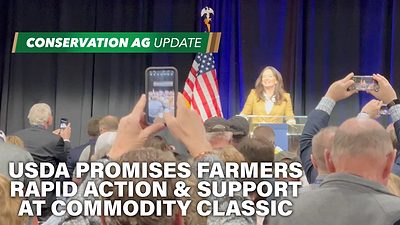Congress should reform U.S. farm subsidies, and end a $5 billion a year "direct payment", as part of delivering an overdue overhaul of the farm program this year, Agriculture Secretary Tom Vilsack said on Monday.
In a speech to the largest U.S. farm group, Vilsack said the farm safety net should be built on the federally subsidized crop insurance system. It also should encourage soil and water conservation and support agricultural research to help feed the rapidly growing world population, he said.
"We need a five-year farm bill and we need it now," said Vilsack.
He spoke to the annual meeting of the six million-member American Farm Bureau Federation (AFBF) on the same day the White House, as expected, formally announced Vilsack would serve in President Barack Obama's second term.
In a statement issued in Washington, Vilsack said Obama wanted Congress to pass the new farm bill. House Republican leaders refused to call a vote on the bill last year. So, Congress extended the now-expired 2008 farm law until Sept 30. It is the first time Congress began drafting a bill in one session and had to re-introduce it in the following session.
Vilsack told the AFBF audience it was "important to work with Congress to reform" the direct payment. Reformers say the subsidy, paid regardless of need, is wasteful during the agricultural boom that began several years ago.
All sides agreed to end the direct payment in the new farm bill but it was renewed as part of extending the 2008 law. It could become a target for budget cuts in coming months, Vilsack said. "Direct payments are less popular, I believe, than crop insurance."
Farm-state lawmakers have proposed $23 billion to $35 billion in cuts in Agriculture Department programs over 10 years. The administration proposed $31 billion, including an end to the direct payment and scaling back crop insurance subsidies for big farmers.
The farm bill would cost roughly $500 billion with the bulk of the money going to food stamps for the poor.
USDA will give growers the option of leaving the Average Crop Revenue Election program, the first subsidy to shield farmers from low prices and poor yields. ACRE, which has not lived up to expectations, was due to expire with the 2008 law.
With a declining share of the U.S. population, rural America "doesn't have as much" political leverage, he said, in urging farmers to seek new alliances. American agriculture has shared goals with immigration reform groups, antihunger advocates and the renewable energy community.
"This is designed to get people thinking in a different way," Vilsack said afterward.





